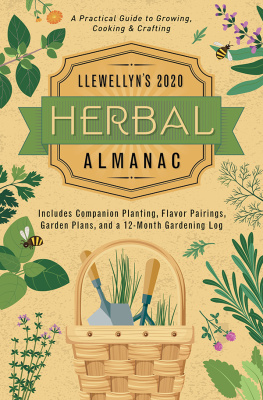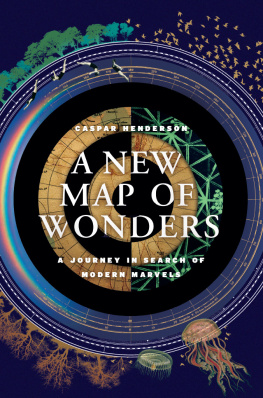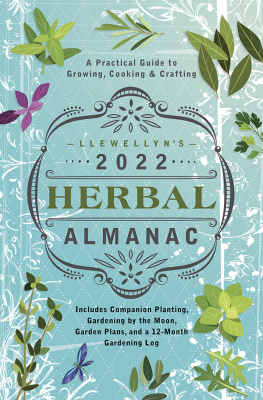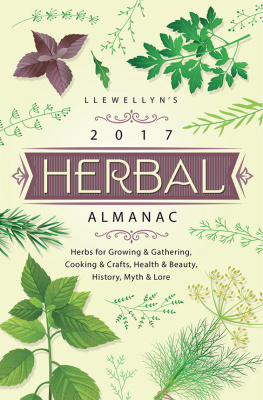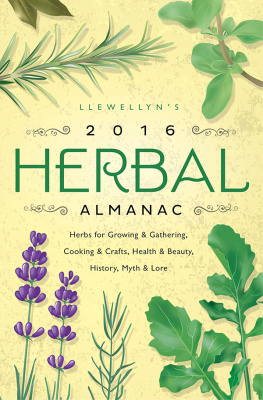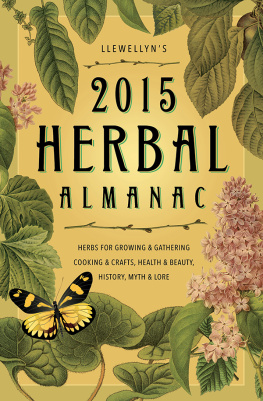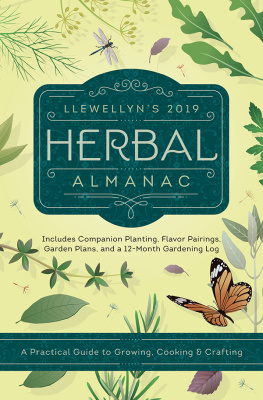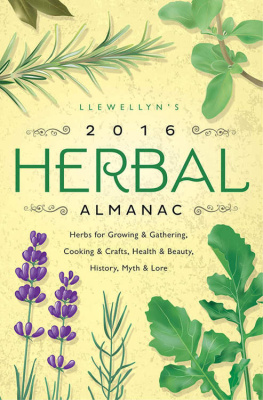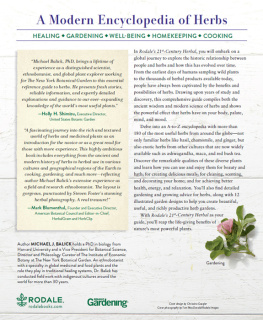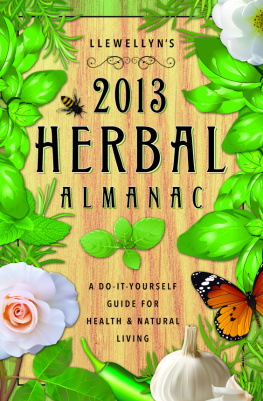Henderson - Llewellyns 2020 Herbal Almanac
Here you can read online Henderson - Llewellyns 2020 Herbal Almanac full text of the book (entire story) in english for free. Download pdf and epub, get meaning, cover and reviews about this ebook. year: 2019, publisher: Llewellyn Worldwide, LTD., genre: Children. Description of the work, (preface) as well as reviews are available. Best literature library LitArk.com created for fans of good reading and offers a wide selection of genres:
Romance novel
Science fiction
Adventure
Detective
Science
History
Home and family
Prose
Art
Politics
Computer
Non-fiction
Religion
Business
Children
Humor
Choose a favorite category and find really read worthwhile books. Enjoy immersion in the world of imagination, feel the emotions of the characters or learn something new for yourself, make an fascinating discovery.
Llewellyns 2020 Herbal Almanac: summary, description and annotation
We offer to read an annotation, description, summary or preface (depends on what the author of the book "Llewellyns 2020 Herbal Almanac" wrote himself). If you haven't found the necessary information about the book — write in the comments, we will try to find it.
Llewellyns Herbal Almanac offers a wide variety of practical ideas on how to benefit from natures most versatile plants. With hands-on projects, fresh ideas, and tips and techniques, this guide is designed for herb enthusiasts of all skill levels. It also features innovative herbal ideas that span gardening, cooking, crafts, health, beauty, history, and lore.
Llewellyns 2020 Herbal Almanac — read online for free the complete book (whole text) full work
Below is the text of the book, divided by pages. System saving the place of the last page read, allows you to conveniently read the book "Llewellyns 2020 Herbal Almanac" online for free, without having to search again every time where you left off. Put a bookmark, and you can go to the page where you finished reading at any time.
Font size:
Interval:
Bookmark:
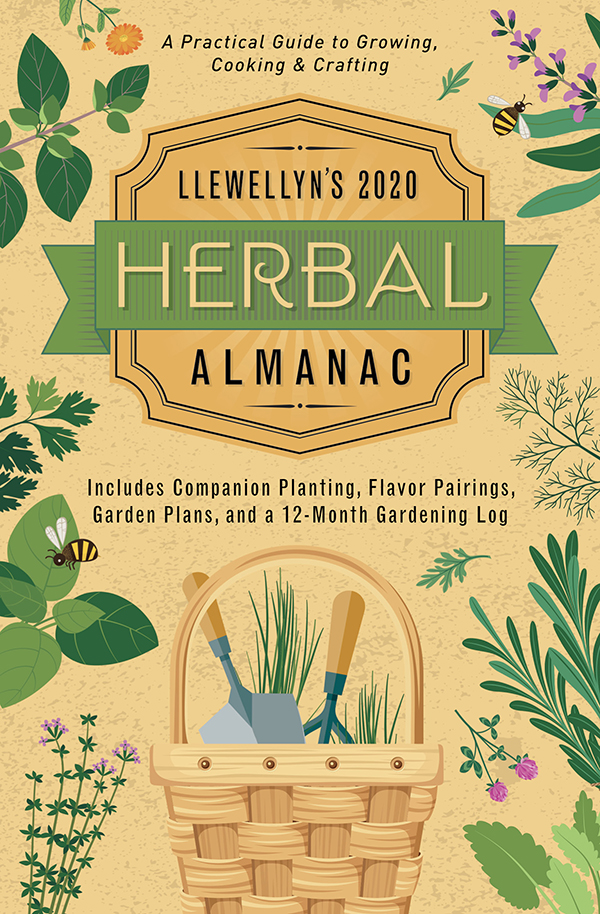

2019 Llewellyn Publications
Llewellyn Publications is a registered trademark of
Llewellyn Worldwide Ltd.
Cover Designer: Kevin R. Brown
Editor: Lauryn Heineman
Interior Art: Fiona King
Garden plan illustrations on pages 28687
by Llewellyn Art Department
You can order annuals and books from New Worlds,
Llewellyns catalog. To request a free copy, call 1-877
NEW WRLD toll-free or visit www.llewellyn.com.
ISBN: 978-0-7387-4944-0
Llewellyn Worldwide Ltd.
2143 Wooddale Drive
Woodbury, MN 55125-2989
Printed in the United States of America
Contents
by Jill Henderson
by James Kambos
by Thea Fiore-Bloom
by Corina Sahlin
by Kathy Vilim
by Monica Crosson
by Suzanne Ress
by Emily Towne
by Dawn Ritchie
by Elizabeth Barrette
by Natalie Zaman
by Linda Raedisch
H by Holly Bellebuono
by Mireille Blacke
by Autumn Damiana
by Diana Rajchel
by JD Hortwort
by Mickie Mueller
by Charlie Rainbow Wolf
: USDA Hardiness Zones
by Anne Sala
by Diana Stoll
by Kathy Martin
by Susan Pesznecker
by Estha K . V. McNevin
Introduction to Llewellyns Herbal Almanac
H olistic care for the mind, body, and soul starts in the garden. Gardeners of all skill levels and climates can find common ground in early morning weeding, combating pests, marveling at this years abundant harvest, and impatiently waiting to plan next years plot. The work is hard, but the rewards are bountiful. Growing herbs is good for the spirit, and using them in home-cooked meals, remedies, and crafts is clean, healthy, and just plain delicious.
The 2020 edition of the Herbal Almanac is a love letter and guidebook to the hands-on application of herbs in our daily lives. With sage advice appealing to novice gardeners and experienced herbalists alike, our experts tap into the practical and historical aspects of herbal knowledgeusing herbs to help you connect with the earth, enhance your culinary creations, and heal your body and mind.
In addition to the twenty-four articles written by Master Gardeners, professors, and homesteaders, this book offers reference materials tailored specifically for successful growing and gathering. Use this book to log important dates, draw your garden plan, practice companion planting, find a helpful herbal remedy, and keep track of goals and chores in the personal logbook pages.
Reclaiming our connection to Mother Earth in our own backyards can bring us harmony and balanceand a delicious, healthy harvest. May your garden grow tall and your dishes taste divine!
Note: The old-fashioned remedies in this book are historical references used for teaching purposes only. The recipes are not for commercial use or profit. The contents are not meant to diagnose, treat, prescribe, or substitute consultation with a licensed health-care professional. Herbs, whether used internally or externally, should be introduced in small amounts to allow the body to adjust and to detect possible allergies. Please consult a standard reference source or an expert herbalist to learn more about the possible effects of certain herbs. You must take care not to replace regular medical treatment with the use of herbs. Herbal treatment is intended primarily to complement modern health care. Always seek professional help if you suffer from illness. Also, take care to read all warning labels before taking any herbs or starting on an extended herbal regimen. Always consult medical and herbal professionals before beginning any sort of medical treatmentthis is particularly true for pregnant women. Herbs are powerful things; be sure you are using that power to achieve balance.
Llewellyn Worldwide does not participate in, endorse, or have any authority or responsibility concerning private business transactions between its authors and the public.

Growing and Gathering

Incredible Neem
 by Jill Henderson
by Jill Henderson 
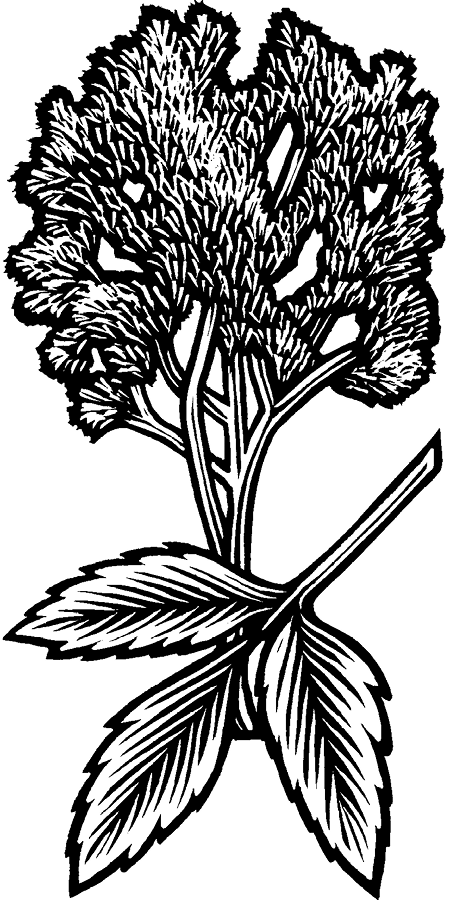
Among the billions of plant allies that have ever been used by the human race, there are few that are as revered and honored as the neem tree. This hardy, drought-loving tree is known to have been used for so many different things that a list of all the ways it can and has been used to aid humankind could easily fill dozens of pages. Suffice it to say that every part of the neem tree is used as food, fodder, medicine, and shelter. It has also been used for building and making many useful things, not least of which are deep-seated spiritual and cultural traditions.
Ancient History of Neem
It is often said that neem is native to the Indian subcontinent, which encompasses the countries of India, Pakistan, Bangladesh, Sri Lanka, and Nepal, but its earliest origins actually begin with the legend of the sunken Dravidian island civilization known as Kumari Kandam or Lemuria some 50,000 years before Christ. Known as nimba in ancient Sanskrit, the neem tree has always been a vitally important plant to East Indian cultures. The Hindu Vedas suggest the neem tree was the creation of a sublime deity whose love and compassion for human life was manifested in a single drop of heavenly elixir from which the miracle tree grew. This wondrous tree not only grew where other trees and plants would not, but every single part of it was enormously useful to humans, animals, and the earth itself.
Siddha medicine, often referred to as Tamil medicine, eventually developed into what we know as Ayurvedawhich is among the oldest known medical systems in the world. Nimba is so ancient that it can be said that the very roots of every branch of natural and allopathic medicine known to man are deeply and ritually entwined with those of the sacred neem tree. It has even been suggested that many bodhisattvas, including the Buddha, utilized the divine shade of the neem tree to achieve enlightenment.
After hearing such a glowing description of neem, you might almost expect it to simply materialize out of thin air and shimmer like the spectral visage of Devi, mother of Shiva. However, unless you sit under a neem tree and meditate until you reach enlightenment, youre more likely to see a simple but attractive tree that in some regions of the world is so prolific that it is considered a weed. Because of neems versatility, astounding medicinal properties, and ability to grow in the most desolate of places, the tree was spread far and wide. As people moved, so did the neem tree. It traveled by way of land and sea through ancient trade routes for thousands and thousands of years. Today, the ancient neem tree can be found growing in more than thirty countries.
Botanists refer to neem by its Latin name, Azadirachta in dica , which was derived from the Persian words azad , which means free,and dirakht , which means tree, to describe what the local people thought of as the free tree of India. Once youve seen a mature neem tree, its easy to recognize that this freely giving tree belongs to the Meliaceae, or mahogany, family, which contains roughly fifty-three genera and upward of six hundred species of flowering trees, shrubs, and a few herbaceous plants. Many resources suggest that there are other species of neem that have different botanical names, but my in-depth research into this suggests that all other Latin names used for neem come from an earlier era of botanical nomenclature.
Font size:
Interval:
Bookmark:
Similar books «Llewellyns 2020 Herbal Almanac»
Look at similar books to Llewellyns 2020 Herbal Almanac. We have selected literature similar in name and meaning in the hope of providing readers with more options to find new, interesting, not yet read works.
Discussion, reviews of the book Llewellyns 2020 Herbal Almanac and just readers' own opinions. Leave your comments, write what you think about the work, its meaning or the main characters. Specify what exactly you liked and what you didn't like, and why you think so.

